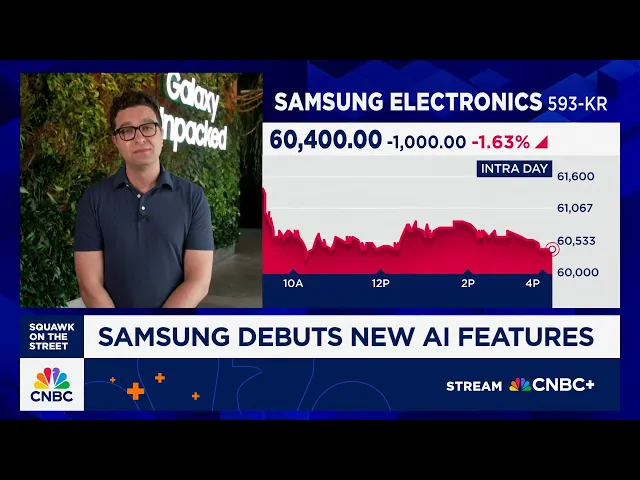Samsung debuts new AI features powered by Google Gemini

Samsung's Google-powered AI makes waves
Samsung has taken a significant leap forward in the mobile technology race, unveiling an array of AI features powered by Google's Gemini models across its flagship Galaxy devices. This collaboration marks a pivotal moment in consumer AI adoption, as two tech giants join forces to bring advanced artificial intelligence capabilities directly into the hands of everyday users. The integration represents Samsung's ambitious push to differentiate its devices in an increasingly competitive smartphone market where hardware innovations alone no longer suffice.
Key Developments
-
Samsung has deeply integrated Google's Gemini AI models across its Galaxy ecosystem, enabling features like Circle to Search, Live Translate, and Note Assist that transform how users interact with their devices.
-
The partnership strategically positions both companies against competitors like Apple, with Samsung gaining cutting-edge AI capabilities while Google expands Gemini's reach to millions of Galaxy users.
-
These AI implementations focus on practical, everyday use cases rather than flashy demonstrations, with features designed to solve real problems like language barriers, information retrieval, and productivity challenges.
The New AI Reality
The most compelling aspect of Samsung's AI implementation is how seamlessly it integrates into everyday tasks without requiring users to fundamentally change their behaviors. Circle to Search perfectly exemplifies this approach—rather than forcing users to switch between apps or learn new commands, it builds upon the familiar action of highlighting text or images to deliver instant, contextual information.
This represents a significant shift in how AI is being positioned in consumer technology. While previous generations of AI features often felt like novelties that users had to go out of their way to access, Samsung and Google are embedding these capabilities directly into the natural flow of device usage. The strategy acknowledges a fundamental truth about technology adoption: features that reduce friction rather than adding steps are the ones that become indispensable.
Industry analysts note that this approach could significantly accelerate mainstream AI adoption. According to a recent Deloitte survey, consumer awareness of AI has skyrocketed in the past year, but actual usage remains relatively low, with many users citing complexity or uncertainty about benefits. By making AI capabilities both powerful and invisible, Samsung is addressing this adoption gap head-on.
Beyond the Announcement
What Samsung's presentation didn't fully explore was the potential competitive response these features might trigger. Apple, which has historically taken a more measured approach to implementing AI, now
Recent Videos
How To Earn MONEY With Images (No Bullsh*t)
Smart earnings from your image collection In today's digital economy, passive income streams have become increasingly accessible to creators with various skill sets. A recent YouTube video cuts through the hype to explore legitimate ways photographers, designers, and even casual smartphone users can monetize their image collections. The strategies outlined don't rely on unrealistic promises or complicated schemes—instead, they focus on established marketplaces with proven revenue potential for image creators. Key Points Stock photography platforms like Shutterstock, Adobe Stock, and Getty Images remain viable income sources when you understand their specific requirements and optimize your submissions accordingly. Specialized marketplaces focusing...
Oct 3, 2025New SHAPE SHIFTING AI Robot Is Freaking People Out
Liquid robots will change everything In the quiet labs of Carnegie Mellon University, scientists have created something that feels plucked from science fiction—a magnetic slime robot that can transform between liquid and solid states, slipping through tight spaces before reassembling on the other side. This technology, showcased in a recent YouTube video, represents a significant leap beyond traditional robotics into a realm where machines mimic not just animal movements, but their fundamental physical properties. While the internet might be buzzing with dystopian concerns about "shape-shifting terminators," the reality offers far more promising applications that could revolutionize medicine, rescue operations, and...
Oct 3, 2025How To Do Homeless AI Tiktok Trend (Tiktok Homeless AI Tutorial)
AI homeless trend raises ethical concerns In an era where social media trends evolve faster than we can comprehend them, TikTok's "homeless AI" trend has sparked both creative engagement and serious ethical questions. The trend, which involves using AI to transform ordinary photos into images depicting homelessness, has rapidly gained traction across the platform, with creators eagerly jumping on board to showcase their digital transformations. While the technical process is relatively straightforward, the implications of digitally "becoming homeless" for entertainment deserve careful consideration. The video tutorial provides a step-by-step guide on creating these AI-generated images, explaining how users can transform...
